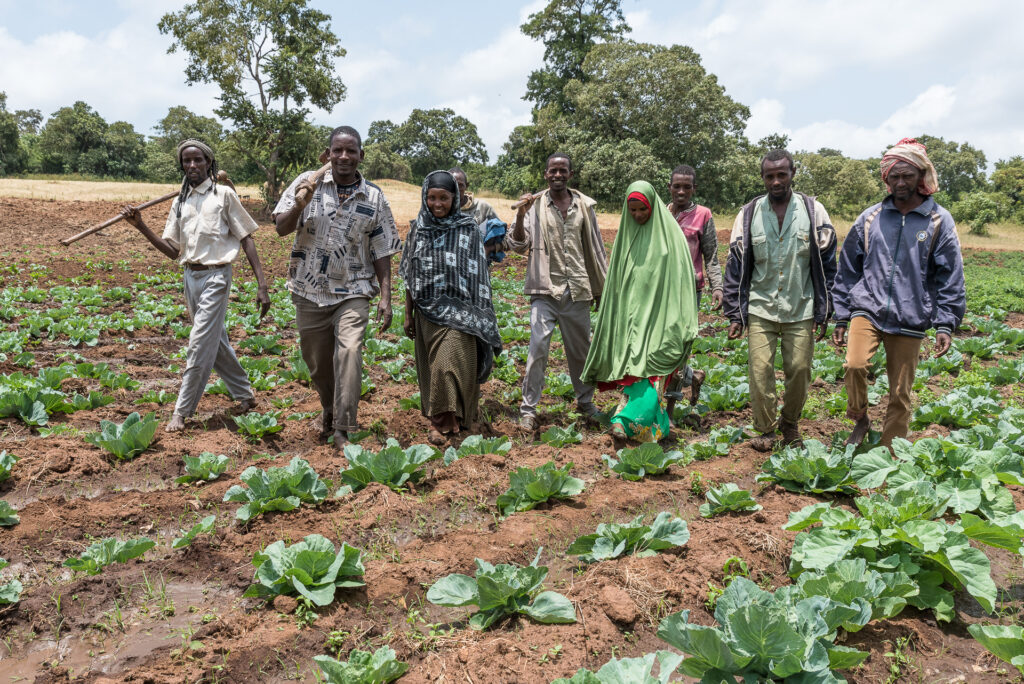The first Climate Summit on African soil kicks off on November 6, in Sharm el-Sheikh. Cordaid and its partner networks will be there. We will call for more climate-resilient food systems, a fairer transition to zero-carbon economies, and more funds for climate action. “Never has it been clearer that we need to fix our food systems in order to tackle climate change”, says food systems expert Bram Peters.

The 27th Conference of the Parties of the UN Framework Convention on Climate Change, known as COP27, is hosted by the Government of the Arab Republic of Egypt from 6 until 18 November 2022. Its goal is to build on previous climate agreements between signatory governments and to pave the way for future ambitions to effectively tackle the global challenge of climate change.
Food and climate
A core focus of this coming COP27 is the link between food and climate. That link is intricate and has a downward spiraling effect: the climate crisis disrupts global food systems, fanning hunger, and food insecurity. Industrial food systems, in turn, are an important driver of climate change.
“Food systems operate at global, national, and local levels and are interwoven throughout society, economy and ecology. This means that we need to make fundamental choices and act decisively in order to make our food systems resilient and sustainable while tackling at the same time the power and poverty inequalities that shape these systems”, Peters continues.
During the Climate Summit in Sharm el-Sheikh, Cordaid and our partners will host several side events. One of them, hosted with FairClimateFund, explains how the carbon market can and should do more than mitigate emissions. Read more about this COP27 side event.
Smallholder farmers need support to adapt to climate change
“Agricultural food systems are responsible for roughly one-third of global greenhouse gas emissions. We see that from farm to fork, supply chain actors are stepping up and taking action to mitigate their carbon footprints”, says Neera van der Geest, director of FairClimateFund.
“At the same time, smallholder and family farmers need support to shape local agricultural systems that can provide food security and are adaptive to climate change. During COP27, Cordaid and FairClimateFund will host an event to explain how the carbon market and fair carbon finance can do more than mitigate emissions, and also play a role to enhance adaptation and realise co-benefits for smallholder farmers”.
Climate justice is social justice
Cordaid and its partners are working in fragile and conflict-affected areas, tackling the impact of the climate crisis in a wide array of programme activities. Our goal is to advocate for climate justice, limit global warming and combat the adverse effects of climate change, side by side with those affected most.
Taking climate action is a matter of justice. Climate justice entails the moral responsibility to take care of our planet for the well-being of current and future generations. It also means that those who contribute most to global warming, the industrialized economies, bear most of the responsibility to reduce carbon emissions, counteract the adverse effects of climate change, and support communities and countries who are least capable to adapt to climate change.
Hand in hand with social movements, faith-based networks, and civil society organisations, we urge world leaders to do what it takes to tackle the climate and ecological crisis and the deepening of social inequality. This includes firmer international action to protect internally displaced people and to ensure all climate actions are gender-responsive.
Read more about Cordaid’s climate justice advocacy.
Cordaid and partners at the CoP27
As climate resilience expert Margot Loof explains, Cordaid advocates for climate justice together with other Dutch NGOs and with our international partner networks. “By working together we can achieve more”, she points out. “Our advocacy is based on input from our local partners who work in areas most affected by climate change.”
During the Climate Summit in Egypt, Cordaid and its partners will host several climate justice-related side events:
- “Addressing loss & damage to deliver climate justice: youth, gender & faith leaders’ perspectives”, by Caritas Internationalis, ChristianAid, ActionAid and Church of Sweden on 9 November.
- “Driving systemic Change: Policy and Finance for Real Zero Solutions”, by CIDSE (network of Catholic social justice organisations) and the Institute for Agriculture and Trade Policy (IATP), on 10 November.
- “Building a Fair Carbon Food System: How food systems transformation can tackle emissions for a low carbon tomorrow”, by Cordaid / FairClimateFund, Fairtrade International, and Foundation Development & Climate Alliance, on 11 November.
- “Delivering the promise: How to ensure future adaptation needs are addressed”, by the ACT Alliance (network of protestant development organisations) and Brot fur die Welt, on 11 November.